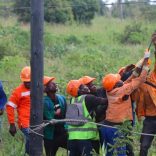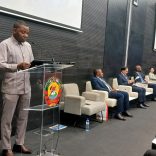Mozambique: Power outage leaves 13,000 EDM customers without electricity in Zambézia
Watch: Total Mozambique LNG Project on schedule, work resumes this quarter – Pouyanné

Screen grab: Total
Oil company Total on Wednesday said that the natural gas project in Mozambique remains on schedule and that construction work should restart this quarter after violence in the region suspended work.
“It is not because we have stopped for two or three months that we cannot reach the 2024 target,” the company’s chief executive Patrick Pouyanné said during the press conference to present the 2020 results.
The onshore works are suspended, but the engineering part is progressing rapidly and work off the coast continues, he added, in statements quoted by the Bloomberg financial information agency, in which he said that an agreement has been reached to ensure the safety of the area of the works in the northern part of the country.
Responsibility for security in the area falls to the government, Pouyanné said, adding that there was a plan to deploy forces in the region to control a perimeter of at least 25 kilometres, but that ideally, the entire province of Cabo Delgado should be secure.
Watch the press conference below:
Total’s 2020 Results & Outlook Live Presentation https://t.co/0yWcNdUBHi
— Total (@Total) February 9, 2021
Transcript Excerpts [Source: Nasdaq]:
“(…) So the second pillar of the strategy is LNG. LNG there, you know that it’s a strong fruit of our cash flow generation. By the way, 2020 demonstrated as well resilience. We have seen, of course, the Brent lost something like 30%. And we have lost itself 16%. Asian prices were at the bottom. And despite that, the cash flow generation from LNG $3.2 billion was quite almost the same as last year. Why, in particular, because we continue to grow. We create value from scale and arbitrage 10% growth, $38 [Phonetic] million tons of sales last year and we expect 10% more for 2021. So we benefited, of course, from the start in particular, which will deliver at full scale in 2021. And so that’s why we have this growth.
“But as you know, we have — this story is not over, because — and we did not stop it. Despite the crisis, we have the two flagship projects in Russia Arctic 2, which is 45% progress on Train 1 by end of 2020 and Mozambique LNG, which is all 21% progress on end 2020.
“We face clearly some security issues, you know it’s public and we are working with the Mozambique government. It does not have at this stage impact on the planning of the projects, which we’ll deliver by 2024, because we are still mainly in the engineering phase, the logistical phase and the offshore works have been maintained.
“But obviously the situation on the ground will need to be controlled and we have a clear plan securing an area of at least 25 kilometres around the project itself in order to be able to resume the work, which is our intent, with our contractors.
“But my highest priority is the security, not only of my staff, but fundamentally as the staff who work on the ground in Mozambique.
“In 2020, we have also maintained our commitment to LNG by sanctioning, like Helle said. The two only projects we have sanctioned worldwide, one is Train 7 in Nigeria and the other one, and we are happy to participate to that, is a project that Sempra is leading on the Pacific Coast of Mexico. It’s a very well located project, closer to Asia, Gulf Coast, obviously, you avoid the bottleneck of the Panama channel. And it’s low-cost project, because it’s fundamentally sort of regas plant, where we benefit from all the infrastructure, JTs are already — have already been invested. And it will be a sourced low-cost Permian gas.
“So that’s interesting. You can notice that on this slide systematically we put to you, we put an indication of the carbon intensity. And it’s linked to the climate ambition that we deliver. We said that we want the allocation of capital should be consistent.
“You don’t mind, probably, but let’s say that the historic LNG plants have a carbon intensity of around 40 kilo per CO2 per barrel or more, 40 to 50. So you can see that the last plants we are, unlike Mozambique, on which the Total teams have done some — to the plants which we inherited from Anadarko, we are making effort to minimize in order of projects [Technical Issues] we have made some interesting moves. (…)”
“(…) Mozambique timeline, onshore work, I mean, let me be clear, we all agree when we met with governments, but the sooner is better that we want to mobilize to remobilize.
“So, if underground again the armed forces and the police are able to recontrol the area that we agreed together, I think end of Q1 should be able to restart the work, that’s the objective that we set to ourselves jointly with the government. So, because, of course, we know what we did.
“But what is very important to us is, we want to be sure that when we will remobilize people, we can really engage in a sustainable work there and there is — we don’t want to reengage and when to stop again, that would be very a detrimental for the trust of all the partners in this project.
“So, let’s first work and so. And again, this is going beyond the situation, but region is not only a matter of average vary around the project is a more global security issue for us, the Mozambique government. And so, we’ll see what we can control — recontrol the situation. (…)”
- Patrick Pouyanné. @ Total’s 2020 Results & Outlook Live Presentation, on Thursday, February 9.
The Mozambique LNG project includes, as well as France’s Total, the National Hydrocarbons Company, Mitsui, Videsh, PTT Exploration & Production, Bharat Petroleum and Oil India.
Several analysts have said that with the current unsafe conditions in the region the project is unlikely to be able to start exporting natural gas by 2024.
Pouyanné said there should be around 10,000 workers on site, but currently, less than 1,000 Total employees are at the site.
The armed violence in Cabo Delgado is causing a humanitarian crisis with more than 2,000 deaths and 560,000 displaced people without housing or food, mainly concentrated in the provincial capital, Pemba.
Total reported record losses of $7.24 billion (€5.98 billion) last year, a transformation year to refocus on new energy, against profits of 9.31 billion the year before.
This result was caused by the negative effects of the Covid-19 pandemic on economic activity and the historic drop in oil prices, Total justified in a statement.
Patrick Pouyanné will propose at the general meeting of shareholders in May that the oil group be renamed TotalEnergies, to symbolise openness to new energy sources, including renewables, as part of its strategy of seeking zero polluting emissions.
Throughout this decade, Total will focus more on natural gas and renewable energies, while oil will constitute, in 2030, only 30% of its activity, compared to 55% today.
😊 Heureux de proposer à notre AG de mai de changer le nom de #Total en #TotalEnergies. Ce sera l’opportunité pour nos actionnaires d’approuver notre stratégie de #transformation en groupe multi-énergies & notre #ambition de neutralité carbone!
👉 https://t.co/Np4z01fZqa pic.twitter.com/qfBJbbRowE
— Patrick Pouyanné (@PPouyanne) February 9, 2021












Leave a Reply
Be the First to Comment!
You must be logged in to post a comment.
You must be logged in to post a comment.